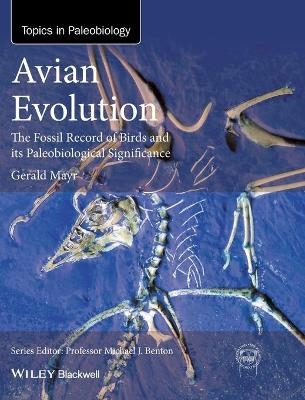
Avian Evolution
Wiley-Blackwell (Verlag)
978-1-119-02076-9 (ISBN)
Gerald Mayr is a German paleontologist who is Curator of Ornithology at the Senckenberg Research Institute in Frankfurt am Main, Hesse. He has published extensively on fossil birds, especially the Paleogene avifauna of Europe. He is an expert on the Eocene fauna of the Messel pit.
Foreword ix
Preface xi
Acknowledgments xiii
Chapter 1 An Introduction to Birds, the Geological Settings of Their Evolution, and the Avian Skeleton 1
Birds Are Evolutionarily Nested within Theropod Dinosaurs 2
The Geological Settings of Avian Evolution in a Nutshell 4
Characteristics of the Avian Skeleton 6
Chapter 2 The Origin of Birds 18
Archaeopteryx: The German “Urvogel” and Its Bearing on Avian Evolution 19
The Closest Maniraptoran Relatives of Birds 22
Feather Evolution 32
The Origin of Avian Flight 37
Chapter 3 The Mesozoic Flight Way towards Modern Birds 43
Jeholornithids: Early Cretaceous Long-Tailed Birds 44
Confuciusornis, Sapeornis, and Kin: Basal Birds with a Pygostyle 45
Ornithothoraces and the Origin of Sustained Flapping Flight Capabilities 50
The Ornithuromorpha: Refinement of Modern Characteristics 55
Ornithurae and the Origin of Modern Birds 59
Chapter 4 Mesozoic Birds: Interrelationships and Character Evolution 64
The Interrelationships of Mesozoic Birds: Controversial Phylogenetic Placements and Well-Supported Clades 65
Character Evolution in Mesozoic Birds 68
Ontogenetic Development of Mesozoic Birds 81
Chapter 5 The Interrelationships and Origin of Crown Group Birds (Neornithes) 84
Phylogenetic Interrelationships of Neornithine Birds 85
The Mesozoic Fossil Record of Neornithine-Like and Neornithine Birds 88
Chapter 6 Palaeognathous Birds (Ostriches, Tinamous, and Allies) 94
The Interrelationships of Extant Palaeognathae 95
Early Cenozoic Palaeognathous Birds of the Northern Hemisphere 95
Long-Winged Ostriches, Rheas, and Tinamous 97
Short-Winged Palaeognathous Birds 101
Biogeography: A Textbook Example of Gondwanan Vicariance Has Been Dismantled 105
Chapter 7 Galloanseres: “Fowl” and Kin 107
Galliformes: From Herbivorous Forest Dwellers to Seed Eaters of Open Landscapes 108
The Waterfowl 113
Gastornithids: Giant Herbivorous Birds in the Early Paleogene of the Northern Hemisphere 118
Dromornithids (Mihirungs or Thunderbirds): Gastornis-Like Birds from Australia 120
Pelagornithids: Bony-Toothed Birds 121
Chapter 8 The “Difficult-to-Place Groups”: Biogeographic Surprises and Aerial Specialists 125
The Columbiform Birds: Doves, Sandgrouse, … and Mesites? 126
The Hoatzin: A South American Relict Species 127
Turacos and Cuckoos 129
Bustards 131
The “Wonderful” Mirandornithes, or How Different Can Sister Taxa Be? 132
Strisores: The Early Diversification of Nocturnal Avian Insectivores 136
Chapter 9 Shorebirds, Cranes, and Relatives 147
Charadriiformes: One of the Most Diverse Groups of Extant Birds 148
From Rail to Crane 156
Chapter 10 Aequornithes: Aquatic and Semi-Aquatic Carnivores 161
Loons: Foot-Propelled Divers of the Northern Hemisphere 162
Pelagic Tubenoses and Albatrosses 164
Penguins: More Than 60 Million Years of Flightlessness 168
The Polyphyletic “Pelecaniformes” and “Ciconiiformes” 174
Late Cenozoic Turnovers in Marine Avifaunas 187
Chapter 11 Cariamiforms and Diurnal Birds of Prey 189
Seriemas and Allies: Two Species Now, Many More in the Past 190
Diurnal Birds of Prey: Multiple Cases of Convergence among Raptorial Birds 197
Chapter 12 The Cenozoic Radiation of Small Arboreal Birds 204
The Courol and Mousebirds: Two African Relict Groups 205
The Long Evolutionary History of Owls 210
Parrots and Passerines: An Unexpected Sister Group Relationship and Its Potential Evolutionary Implications 212
Trogons, Rollers, and Woodpeckers: Cavity-Nesters with Diverse Foot Morphologies 223
Chapter 13 Insular Avifaunas Now and Then, on Various Scales 233
Islands and Isolated Continents as Refugia 234
The Evolution of Flightlessness in Predator-Free Environments 235
Insular Gigantism and Islands as Cradles of Unusual Morphologies 241
Glossary 245
References 248
Index 289
| Erscheinungsdatum | 08.11.2016 |
|---|---|
| Reihe/Serie | TOPA Topics in Paleobiology |
| Verlagsort | Hoboken |
| Sprache | englisch |
| Maße | 198 x 249 mm |
| Gewicht | 885 g |
| Themenwelt | Naturwissenschaften ► Biologie ► Evolution |
| Naturwissenschaften ► Biologie ► Zoologie | |
| Naturwissenschaften ► Geowissenschaften ► Geologie | |
| Naturwissenschaften ► Geowissenschaften ► Mineralogie / Paläontologie | |
| ISBN-10 | 1-119-02076-X / 111902076X |
| ISBN-13 | 978-1-119-02076-9 / 9781119020769 |
| Zustand | Neuware |
| Haben Sie eine Frage zum Produkt? |
aus dem Bereich


